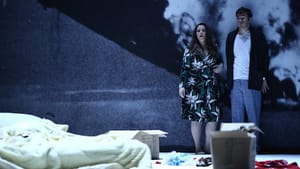Stay in the Loop
BSR publishes on a weekly schedule, with an email newsletter every Wednesday and Thursday morning. There’s no paywall, and subscribing is always free.
Awkward family photos
Curtis Opera Theatre and Opera Philadelphia present Leonard Bernstein’s ‘A Quiet Place’

Leonard Bernstein’s centennial season gallops apace across Philadelphia, and even his problem children have been invited to the party. No work in the Bernstein corpus is more problematic than A Quiet Place, his much-debated and much-revised final opera. The latest attempt to burnish this deeply flawed work comes from Curtis Opera Theatre and Opera Philadelphia, who jointly presented the American premiere of a chamber adaptation by composer and musicologist Garth Edwin Sunderland.
"Thirtysomething, the opera"
This new production, directed by Daniel Fish and conducted by Opera Philadelphia music director Corrado Rovaris, attempts to make a case for A Quiet Place as a lost gem of the contemporary operatic repertory. Bernstein’s musical language still comes across as frustratingly muddled, and Sunderland’s reduced version omits what many consider the score’s best element — Trouble in Tahiti, the jazz-tinged 1951 opera that serves as a companion piece and fleshes out the occasionally obtuse characters.
Fish’s stark, expressionistic production downplays some of the more hackneyed aspects of Stephen Wadsworth’s libretto. A Quiet Place, which premiered in 1983, can come across very much as a "Me Decade" time capsule, a collection of outmoded tropes and television stereotypes. A friend of mine jokingly calls it “Thirtysomething, the opera.” But his combination of abstract sets (by Laura Jellinek), atmospheric lighting (by Barbara Samuels), and stylized acting by the talented cast of Curtis students makes the piece seem more realistic and relatable than ever.
What could easily become a mawkish and maudlin examination of familial disappointment and pain instead resembles an examination of generational anguish, which is exactly what Bernstein set out to explore.
The Age of Anxiety
A Quiet Place follows Sam and Dinah, the newly married suburban couple introduced in Trouble in Tahiti, to their logical conclusion. The earlier work planted seeds of discord in their seemingly ordered life; it served as a deconstruction of outwardly idealized postwar American culture. Thirty years later, Dinah is dead (possibly by suicide); Sam has realized his cheerful existence was largely an illusion; and the couple’s adult children, Dede and Junior, have inherited a cornucopia of neuroses from Mom and Dad.
Bernstein’s score reminds the listener of his past works. A wailing clarinet heard at Dinah’s funeral recalls the first movement of Symphony No. 2, The Age of Anxiety (which the Philadelphia Orchestra will perform next week); elsewhere, elements of jazz, swing, and bebop call to mind West Side Story at its most ebullient.

The results don’t always cohere, and Bernstein’s vocal writing sometimes sounds needlessly treacherous. But Rovaris, conducting members of the Curtis Symphony Orchestra, treats the music seriously without taking too scholarly an approach. The result sounds greater than the sum of its parts.
The first act — set entirely at Dinah’s funeral — proves the most dramatically engaging. Fish has the large group of mourners sit in a row, addressing their dialogue directly to the audience. This produces the effect of people talking around each other, evoking the polite but distant small talk one would expect at a tragic event. Baritone Patrick Wilhelm and mezzo-soprano Anastasiia Sidorova particularly stand out among the mourners.
Mezzo Siena Licht Miller plays Dinah as a non-singing apparition who haunts the stage, teasing her husband and children. A tall, striking figure in a mink coat and Jackie O sunglasses, Miller suggests Dinah’s influence over her family and community without needlessly pulling focus. Her presence is a smart dramaturgical choice.
Soprano Ashley Milanese excels as daughter Dede, her light, limpid tone conveying the character’s muted anguish. Curtis alum Jean-Michel Richer brings a pliant tenor voice to François, Dede’s French Canadian husband; a Montréal native himself, he sings the character’s French-inflected lines with authority. But I wish Sunderland’s revised libretto did more to flesh out their complicated relationship, which includes a past affair between François and Junior.
A few holdovers
Junior remains the piece’s most complicated character. As costumed here by Terese Wadden, his appearance suggests what we would now call gender fluidity: he makes his entrance in fishnets, a sequined top, and makeup. But it seems little else has evolved in 35 years — the libretto reinforces queer stereotypes that link gay identity with mental illness, predatory behavior, and disturbing sexual peccadillos.
Despite these alarmingly reductive traits, baritone Dennis Chmelensky works hard to give the character an inner life. He also sings with beautiful (if not always clarion) diction. Taken together, Chmelensky, Milanese, Richer, and baritone Tyler Zimmerman (as Sam) succeed in furthering the feeling of a genuine family dynamic. The opera ends with a believable sense of resolution.
The audience's fitful reaction at the second performance suggests that many still don’t know what to make of A Quiet Place. I’m not sure I do either, but I left this production with a newfound respect for a work I’ve often derided. Maybe that’s the takeaway: problem children still deserve attention.
What, When, Where
A Quiet Place. By Leonard Bernstein and Stephen Wadsworth, Garth Edwin Sunderland adapted, Daniel Fish directed. Co-production of Curtis Opera Theatre and Opera Philadelphia. Through March 11, 2018, at the Kimmel Center’s Perelman Theatre, 300 S. Broad Street, Philadelphia. (215) 732-8400 or operaphila.org.
March 13, 2018, at the Kaye Playhouse at Hunter College, 68th Street between Park and Lexington Avenues, New York. (212) 772-4448 or ovationtix.com.
Sign up for our newsletter
All of the week's new articles, all in one place. Sign up for the free weekly BSR newsletters, and don't miss a conversation.
 Cameron Kelsall
Cameron Kelsall